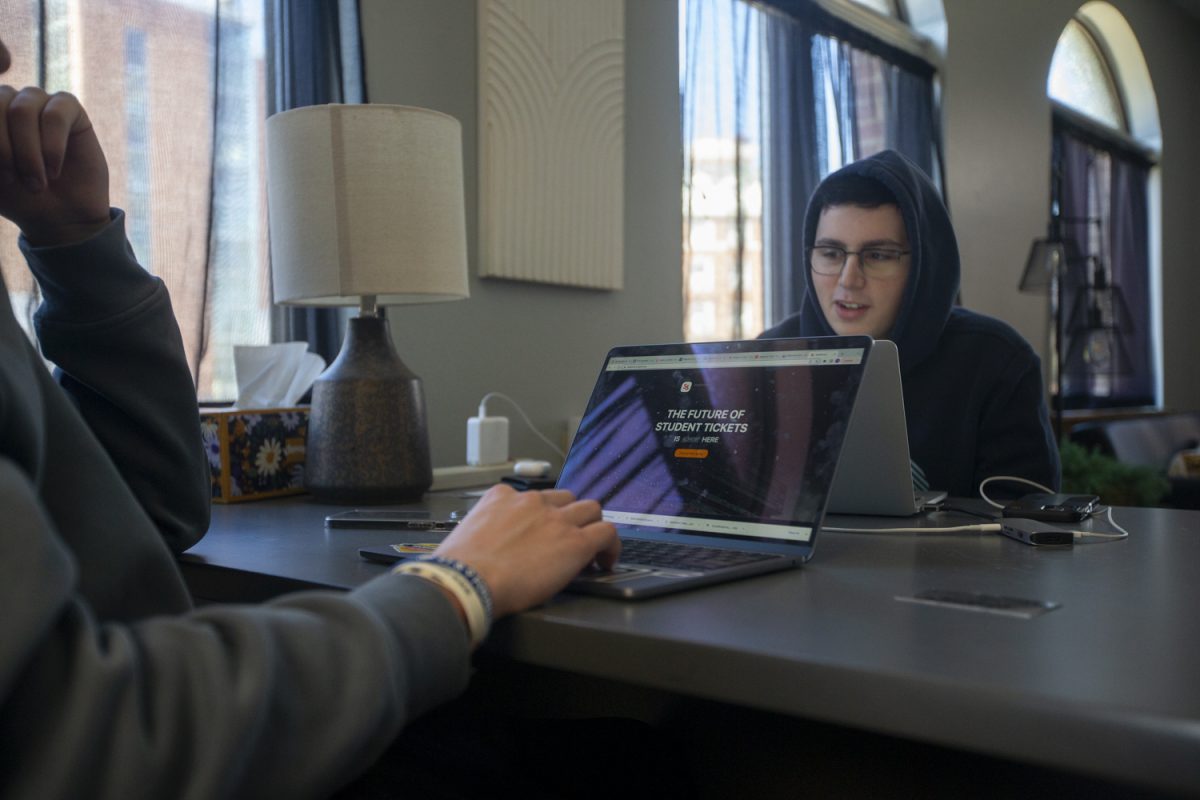Social media has become a catalyst for ticket scammers, and college students are some of the biggest victims.
A new report from the Better Business Bureau shows that young adults between 18-24 years old are losing more money to scams than older adults. Of 18-to-19-year-olds who have been scammed, 47 percent cited social media as the main contact method between them and the seller.
That’s why a group of University of Iowa students created SeatStock, an AI-driven student ticket reselling engine set to launch on Feb. 19. After being scammed out of Iowa football tickets last season, SeatStock CEO Josh Cohen and COO Brady Stein were inspired to create a safer platform for their peers to exchange tickets.
According to a customer discovery survey conducted by SeatStock founders, 40 percent of UI students have been scammed out of tickets.
Joining Cohen and Stein is UI graduate student Brandon Egger, who handles the technology side of things, and Adam Hasan, who assesses the financial position of the company and reaches out to investors. The group holds an executive meeting every Monday to talk through the project and set new goals for the week. Their advisor, Scott Samuel, joins meetings sometimes and gives “some words of wisdom,” according to Stein. Hailing from Chicago, Samuel has experience as a CEO, founder, and investor.
As of now, only UI students can access the website by entering their university email, but all users are kept anonymous.
Once logged in, users can list a ticket for any price, and potential buyers will bid until there’s a price match. SeatStock will then pair up the two users, giving the seller the buyer’s phone number. Once the buyer marks that they’ve received the ticket, SeatStock will facilitate the funds to the seller. If there are issues, SeatStock will step in and moderates the transaction.
The founders hope to expand SeatStock to different schools across the country in the summer and have a mobile app by the start of the college football season.
“The end goal, obviously, is we want to disrupt the ticket industry as a whole and compete with Ticketmaster, StubHub, all the big giants. So, we’re starting off with student tickets because we feel like it could be the most easily disrupted, and it’s the most broken right now,” Stein said.
In September 2023, the UI Police Department released a statement warning Hawkeye football fans to be aware of ticket scams. It said most of the reported scams at that point in the football season occurred through “social media websites and instant messaging platforms.”
If a student doesn’t buy season tickets or one of the three-game mini packs Iowa offers, they usually rely on Facebook Marketplace, Snapchat, or X, formerly known as Twitter. Jason Osowski, a UI second-year student, joined one of the many Iowa Hawkeye ticket exchange groups on Facebook in hopes of finding football tickets for himself and a friend.
It was his first and last time using the platform.
Osowski directly messaged a user who was selling tickets a few days before a game. The seller told him to first send “almost 90 bucks” on Venmo, and then he would transfer the tickets the day of the game. Osowski didn’t think much of it, reiterating it was his first time using the platform and he assumed that process was normal. When Osowski woke up on game day and checked his phone, he was blocked by the seller and never received the student tickets.
“I didn’t think anyone would ever do that to someone else, so I was pretty disappointed,” he said.
Since then, Osowski and his friends have bought tickets off StubHub and haven’t had problems. Osowski said he will use SeatStock when it launches.
“From what Brady has told me, [SeatStock] is very safe, and they take lots of pride in customer and seller safety,” Osowski said.
This isn’t just happening in Iowa. The University of Michigan also sent out a message during football season to warn fans of ticket scams. Michigan students use a platform like SeatStock called Student Seats. The site was created by former Alabama students Jared Waller and John Ritondo in the spring of 2020 as part of a class project.



